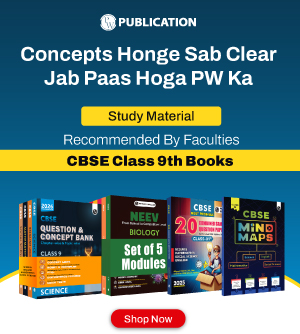NCERT Solutions for Class 9 Social Science Civics Chapter 1

NCERT Solutions for Class 9 Social Science Civics Chapter 1:- In Class 9 Civics Chapter 1, titled "What is Democracy? Why Democracy?", students learn about the basic idea of democracy and why it is important. The chapter explains that democracy is a form of government where people have the power to make decisions and elect their leaders. It also talks about the advantages of democracy, such as equality and freedom, but also highlights the challenges it faces.
The Class 9 Civics Chapter 1 questions and answers help students better understand these concepts, making it easier to learn about why democracy is considered the good system of government. Whether you are looking for Class 9 Civics Chapter 1 question answers or the What is Democracy, Why Democracy Class 9 questions and answers, these solutions will guide you through the key points.If you're looking for the NCERT Solutions for Class 9 Civics Chapter 1, "What is Democracy? Why Democracy?", Here is the detailed solutions. Explore the complete NCERT solutions for Civics Class 9 Chapter 1 below. All the answers are explained in alignment with CBSE guidelines.
However, before starting Class 9 Civics Chapter 1, it's recommended to first go through the chapter and examples. This will help you understand the core concepts of democracy and why it is important, enabling you to apply these ideas effectively.
Check ou: Class 9th Books
NCERT Solutions for Class 9 Social Science Civics Chapter 1
Go through the NCERT Solutions for Class 9 Social Science Civics Chapter 1 below.
1. Here is some information about the four countries. Based on this information, how would you classify each of these countries? Write ‘democratic’, ‘undemocratic’ or ‘not sure’ against each of these.
Country A: People who do not accept the country’s official religion do not have a right to vote.
Country B: The same party has been winning elections for the last twenty years.
Country C: The Ruling party has lost in the last three elections.
Country D: There is no independent election commission.
Answer.
Country A: Undemocratic
Country B: Not sure
Country C: Democratic
Country D: Undemocratic
2. Here is some information about four countries. Based on this information, how would you classify each of these countries? Write ‘democratic’, ‘undemocratic’ or ‘not sure’ against each of these.
Country P: The parliament cannot pass a law about the army without the consent of the Chief of the Army.
Country Q: The parliament cannot pass a law reducing the powers of the judiciary.
Country R: The country’s leaders cannot sign any treaty with another country without taking permission from its neighbouring country.
Country S: All the major economic decisions about the country are taken by officials of the central bank, which the ministers cannot change.
Answer.
Country P: Undemocratic
Country Q: Democratic
Country R: Undemocratic
Country S: Undemocratic
3. Which of these is not a good argument in favour of democracy? Why?
-
People feel free and equal in a democracy.
-
Democracies resolve conflict in a better way than others.
-
Democratic government is more accountable to the people.
-
Democracies are more prosperous than others.
Answer. Claiming that democracies are always more prosperous is flawed. Being democratic means involving citizens in decision-making and elections, but economic prosperity depends on many factors like geography, resources, and government policies, not just democracy.
4. Each of these statements contains a democratic and undemocratic element. Write out the two separately for each statement.
-
A minister said that some laws have to be passed by the parliament in order to conform to the regulations decided by the World Trade Organisation (WTO).
-
The Election Commission ordered re-polling in a constituency where large-scale rigging was reported.
-
Women’s representation in parliament has barely reached 10 per cent. This led women’s organisations to demand one-third of seats for women.
Answer.
Democratic element – A minister emphasized the necessity of parliamentary approval for certain laws.
Undemocratic element – Compliance with regulations mandated by the World Trade Organization (WTO).
Democratic element – The Election Commission mandated re-polling in a constituency.
Undemocratic element – Widespread reports of election rigging.
Democratic element – Women’s organizations advocating for one-third of parliamentary seats for women.
Undemocratic element – Women's representation in parliament remains below 10 percent.
5. Which of these is not a valid reason for arguing that there is a lesser possibility of famine in a democratic country?
-
Opposition parties can draw attention to hunger and starvation.
-
A free press can report suffering from famine in different parts of the country.
-
The government fears its defeat in the next elections.
-
People are free to believe in and practise any religion.
Answer. The statement, ‘People are free to believe in and practice any religion’, is not a valid reason for arguing that there is a lesser possibility of famine in a democratic country.
Check out: Class 9th Combo Set of 5 Books
6. There are 40 villages in a district where the government has made no provision for drinking water. These villagers met and considered many methods of forcing the government to respond to their needs. Which of these is not a democratic method?
-
Filing a case in the courts claiming that water is part of the right to life.
-
Boycotting the next elections to give a message to all parties.
-
Organising public meetings against the government’s policies.
-
Paying money to government officials to get water.
Answer. Paying money to government officials to get water is not a democratic method.
7. Write a response to the following arguments against democracy:
-
The army is the most disciplined and corruption-free organisation in the country. Therefore, the army should rule the country.
-
The rule of the majority means the rule of ignorant people. What we need is the rule of the wise, even if they are in small numbers.
-
If we want religious leaders to guide us in spiritual matters, why not invite them to guide us in politics as well? The country should be ruled by religious leaders.
Answer.
While the army is known for its discipline, it becomes undemocratic when it assumes governance without citizen choice.
The rule of the majority does not equate to the rule of ignorance. Governance requires an understanding of law and order, a subjective aspect of wisdom.
Religion and politics serve distinct purposes. While religion offers guidance in spiritual matters, politics is essential for national governance and should remain separate.
8. Are the following statements in keeping with democracy as a value? Why?
-
Father to daughter: I don’t want to hear your opinion about your marriage. In our family, children marry where the parents tell them to.
-
Teacher to student: Don’t disturb my concentration by asking me questions in the classroom.
-
Employee to the officer: Our working hours must be reduced according to the law.
Answer.
-
The statement contradicts democratic values, as it restricts the daughter from expressing her opinion.
-
The statement undermines democratic principles, denying students their right to ask questions.
-
The statement upholds democratic law, allowing employees to voice their opinions as protected by their rights under the law.
9. Consider the following facts about a country and decide if you would call it a democracy. Give reasons to support your decision.
-
All the citizens of the country have the right to vote. Elections are held regularly. The country took loans from international agencies.
-
One of the conditions for giving loans was that the government would reduce its expenses on education and health.
-
People speak more than seven languages, but education is available only in one language, the language spoken by 52 per cent of people in that country.
-
Several organisations have given a call for peaceful demonstrations and nationwide strikes in the country to oppose these policies. The government has arrested these leaders.
-
The government owns the radio and television in the country. All the newspapers have to get permission from the government to publish any news about the government’s policies and protests.
Answer. This country professes democracy, granting citizens the right to vote and elect their government. However, securing loans from international bodies often necessitates reductions in education and healthcare spending, contradicting democratic principles.
Restricting education to a single language infringes on fundamental rights; governments must ensure education is accessible in languages understood by all citizens.
The right to peacefully assemble and protest is a fundamental individual right. Therefore, arresting protestors violates democratic norms.
Government control of radio and television impedes free press rights, further undermining democratic principles.
Read More: CBSE Class 9 Question Bank PDF Download
Class 9 Social Science Civics Chapter 1 Summary
Chapter 1 of Class 9 Social Science Civics typically covers topics related to "Democracy in the Contemporary World." It introduces students to the concept of democracy, its importance, and its various forms around the world. Key points often discussed include:
Understanding Democracy: Definition of democracy, its core principles such as equality, freedom, and participation of citizens in decision-making.
Forms of Democracy: Comparison between direct and indirect democracy, parliamentary and presidential forms of government.
Global Perspectives: Examples of democratic and non-democratic countries, highlighting how different nations implement democratic principles.
Challenges to Democracy: Common challenges faced by democracies, such as inequality, corruption, and political apathy.
Importance of Democracy: Advantages of democracy in promoting political stability, protecting individual rights, and fostering economic development.
Check out: Class 9th Social Science Book
Class 9 Social Science Civics Chapter 1 FAQs
Q1. What is democracy?
Ans. Democracy is a form of government where the people have the authority to choose their governing legislators in free and fair elections.
Q2. What are the main features of democracy?
Ans. Key features include equality of all citizens before the law, freedom of expression and assembly, participation of citizens in decision-making, and respect for minority rights.
Q3. How does democracy promote political stability?
Ans. Democracy promotes stability by allowing peaceful transitions of power through elections, ensuring accountability of leaders to citizens, and providing mechanisms for resolving conflicts peacefully.
Q4. What are the different forms of democracy?
Ans. Forms include direct democracy (where citizens directly participate in decision-making), representative democracy (where citizens elect representatives to make decisions), and variations like parliamentary and presidential systems.
Q5. What are the challenges to democracy?
Ans. Challenges may include inequality, corruption, political apathy, threats to freedom of speech and assembly, and difficulties in maintaining effective governance amidst diverse interests.








